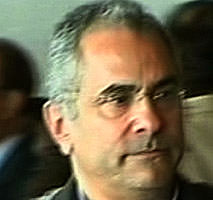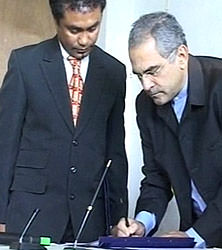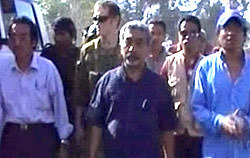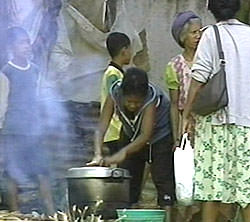 When Bishop Carlos Felipe Ximenes Belo and Foreign Minister José Ramos Horta jointly won the Nobel Peace prize in 1996 they made the long suffering Timorese people immensely proud and brought great hope after two decades of brutal Indonesian occupation. They also set a world record for East Timor–it had one prize for every 500,000 people.
When Bishop Carlos Felipe Ximenes Belo and Foreign Minister José Ramos Horta jointly won the Nobel Peace prize in 1996 they made the long suffering Timorese people immensely proud and brought great hope after two decades of brutal Indonesian occupation. They also set a world record for East Timor–it had one prize for every 500,000 people.
Ordinary Timorese had largely followed their example by practicing reconciliation following the events of 1999, and the previous 24 years of occupation. Until recently, East Timor was a remarkably safe and peaceful place in which to live, despite a traumatic past and overwhelming poverty.
But for a country with such a proud record, the new government installed in May 2002 pursued some very uncompromising policies. It refused to pursue justice for the atrocities of 1999, and in so doing left many wounds festering. More seriously, it created rival security forces and fostered a mini arms race as various factions armed themselves with the latest weaponry.
In 2006, the government’s inept handling of a dispute in the army involving soldiers from the western region of East Timor put the young nation on the brink of civil war, and has now created a new tension between east and west within East Timor.
This has been part of a broader pattern of questionable governance pursued by a government led by a clique of Timorese who lived in exile in Communist Mozambique during the Indonesian years. Alkatiri’s government has come to be seen by the population as arrogant, authoritarian, highly centralised and to some degree anti-democratic. They had controlled the portfolios of prime minister, natural resources and minerals, finance and planning, state administration, interior, defence and agriculture.
The new government managed to completely alienate the country’s oldest and most powerful institution –the Catholic Church. It had also shown contempt for some basic democratic principles; it proposed making defamation a criminal offence and it had intended to conduct next year’s parliamentary election without international supervision.
At the core of this crisis was a dispute involving 600 soldiers, representing almost half of the army, who claimed that senior officers from the eastern region discriminated against them. The government’s decision to sack the soldiers created an angry mob, and this spiraled into widespread east-west violence.
 This violence continued as this latest edition of Eureka Street went to print. In the last week of June more houses and businesses were torched, despite the presence of more than 3,000 international troops. One of the targets was the business of Pedro Lebere, a leading easterner whose Vila Harmonia guest house was a clandestine base for many journalists and independence activists during the Indonesian years. Mr. Lebere and his family planned to leave East Timor last week out of fear for their own safety.
This violence continued as this latest edition of Eureka Street went to print. In the last week of June more houses and businesses were torched, despite the presence of more than 3,000 international troops. One of the targets was the business of Pedro Lebere, a leading easterner whose Vila Harmonia guest house was a clandestine base for many journalists and independence activists during the Indonesian years. Mr. Lebere and his family planned to leave East Timor last week out of fear for their own safety.
The east-west divide is a recent problem in East Timor. It is an artificial division created by the government’s failure to resolve the military dispute. Now in Dili there are more than 70,000 people in refugee camps, and just as many in camps around the country. Hundreds of homes and markets burnt to the ground as a result of this new division, and the country must now rebuild the police force and military forces from scratch.
A mark of this deep division is the major east-west ‘transit camps’ now located immediately to the west of Dili. The camps exist because bus drivers from the west will not drive any further into the eastern region, so those easterners fleeing back to their homes in the east are dropped there, Dr Jay Maheswaran, country director of Caritas Australia, told me.
Upon becoming independent, East Timor had the opportunity to avoid creating an army. But the decision to establish the FDTL, as the army is known, came about largely because President Xanana Gusmao had wanted an institution to carry on the military tradition created by the FALINTIL resistance army. Many of the veterans found positions in the 1,500-strong army and remained loyal to Gusmao.
A much bigger, 3,000-strong national police force, known as the PNTL, was created during the UN transitional administration, with a mandate for internal security. A small number, believed to be around 100, had formerly served in the Indonesian police force. But the power-hungry former Interior Minister, Rogerio Lobato, wanted to turn the PNTL into his personal fiefdom and fomented rivalry with FDTL.
 Worse still, Lobato established a special response unit known as the UIR which was armed not with batons and riot shields, but with about 200 Steyr assault rifles. These are the same highly-effective rifles used by the Australian Army. This was just one weapon in the huge arsenal brought into East Timor. The police also imported more than 3,500 Glock pistols, 64 FNC assault rifles and seven F-2000 automatic rifles. More than 200,000 rounds of ammunition were imported under a contract awarded to a company controlled by the brother of Alkatiri.
Worse still, Lobato established a special response unit known as the UIR which was armed not with batons and riot shields, but with about 200 Steyr assault rifles. These are the same highly-effective rifles used by the Australian Army. This was just one weapon in the huge arsenal brought into East Timor. The police also imported more than 3,500 Glock pistols, 64 FNC assault rifles and seven F-2000 automatic rifles. More than 200,000 rounds of ammunition were imported under a contract awarded to a company controlled by the brother of Alkatiri.
With both institutions armed to the teeth, clashes between them had occurred in 2004 and 2005, but no-one could see that a full-blown conflict was on the horizon. In the 2006 crisis, the government refused to hear the grievances of the 600 striking soldiers, known as the ‘petitioners’. Former Prime Minister Alkatiri, would not meet with the soldiers. The head of the army, Brigadier General Taur Matan Ruak, and former defence minister, Roque Rodriguez also refused to meet them, and were overseas at key moments in the dispute. Instead of reconciling differences, the government turned the army and police onto a soldiers’ demonstration on April 28, prompting more soldiers from the western region of East Timor to join the petitioners.
One month later, the country was on the brink of full scale civil war as the remaining soldiers in FDTL, mainly from the east, fought gun battles in Dili with the petitioners and with elements of the PNTL and UIR. A group of 10 unarmed PNTL officers were mowed down in cold blood as they surrendered under a UN flag. On May 25 Australian troops landed in Dili and gradually managed to quell the violence.
For the next four weeks, however, East Timor remained a volatile place. Truckloads of anti-Alkatiri protesters rolled into the capital and encircled the Government Palace, while motorcycle gangs thundered around the capital. Most of the demonstrators were youths, many of whom had not worked in some years as the new government failed to generate jobs and economic activity.
José Ramos Horta called for the resignation of the prime minister, saying that he must take ultimate responsibility. Alkatiri responded by sacking defence minister Roque Rodrigues and interior minister Rogerio Lobato, but refused to fall on his own sword.
Alkatiri remained defiant, even after sensational allegations were broadcast by the ABC’s 4 Corners program. The program reported claims that Lobato had armed civilian hit squads to wipe out the petitioners, political opponents and senior members of the church, and that Alkatiri knew of the plan. The allegations came from a commander of one of the squads and from the Police Commissioner, Paulo Martins. A warrant for the arrest of Lobato has been issued.
Alkatiri’s position became untenable after Lobato implicated him in the plot, and it was only at this point that he agreed to stand down. The Prosecutor-General, Longuinhos Monteiro, now wants to question the former prime minister. But fears remain that the wily Alkatiri could return to the helm, either in the near future or after the next election. The FRETILIN ruling party must now decide on a replacement.
A good starting point for renewal will be following through on UN supervision for the 2007 parliamentary elections. Another essential change is to decriminalise defamation in the penal code and rebuild the national media. Further down the track, East Timor, with assistance from the UN, will need to rebuild the PNTL and also think hard about what to do with the remnants of the FDTL. Perhaps this tiny country does not need an army after all.
Filling the sovereignty vacuum will depend on installing a new leadership that can gain the trust of the people, many of whom now live in fear in refugee camps. Making this transition will require more forthright and sensible leadership than that shown so far by President Xanana Gusmao, and Foreign Minister José Ramos Horta.
 There remains a danger that the new leadership will maintain close links with Alkatiri, and that he may even retain his influence. Ana Pessoa had a chance to assume the leadership. Pessoa, who has been hailed by Ramos Horta as a candidate, is best known for refusing to speak the national language, Tetum. Instead, she only speaks in Portuguese, even when her audience does not understand her. She has also recently made a series of inflammatory statements about Australia, including the claim that the Australian military orchestrated the destruction. She is also believed to be hostile to East Timor’s other big neighbour, Indonesia. Perhaps it is fortunate that in the last days Ramos Horta has been named the new prime minister after all, even if some of his recent decisions have been somewhat questionable.
There remains a danger that the new leadership will maintain close links with Alkatiri, and that he may even retain his influence. Ana Pessoa had a chance to assume the leadership. Pessoa, who has been hailed by Ramos Horta as a candidate, is best known for refusing to speak the national language, Tetum. Instead, she only speaks in Portuguese, even when her audience does not understand her. She has also recently made a series of inflammatory statements about Australia, including the claim that the Australian military orchestrated the destruction. She is also believed to be hostile to East Timor’s other big neighbour, Indonesia. Perhaps it is fortunate that in the last days Ramos Horta has been named the new prime minister after all, even if some of his recent decisions have been somewhat questionable.
Rebuilding the country will be aided greatly by the revenue now pouring into the government’s coffers from oil and gas. This is one of Alkatiri’s positive legacies, as his leadership led to a much more favourable share of revenue from the Timor Sea than had been previously allowed by Indonesia. Alkatiri spent a lot of time building up the institutions to manage this revenue, but too little of it made its way into the economy, and to the outlying districts especially, in a highly centralised government. Now is the time for the government to spend and rebuild.
The process of putting this broken country back together will be long. While East Timor was physically destroyed in 1999, the people were unified; they had voted 78.5 per cent in favour of independence.
The focus will now turn to more reconciliation and reintegration for those who now live in fear in refugee camps and have lost family members or their homes. The new Government of José Ramos Horta, the Catholic Church and aid organisations will soon begin the long process of reconciling and reintegrating people in a nation that has suffered setback after setback in the last 30 years.